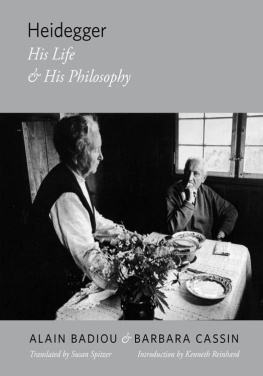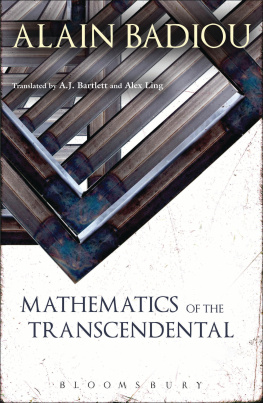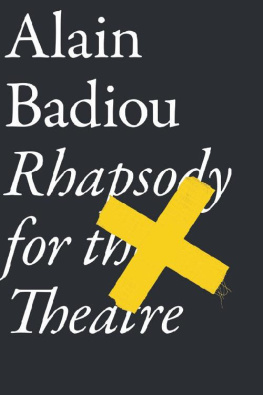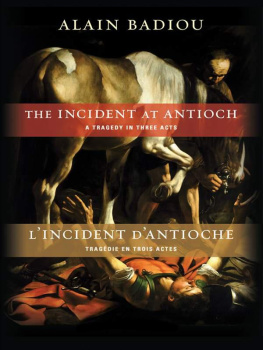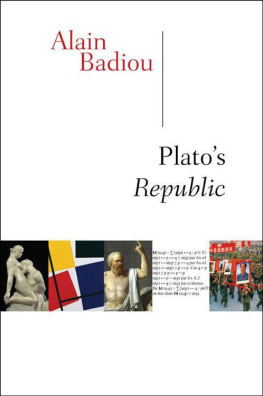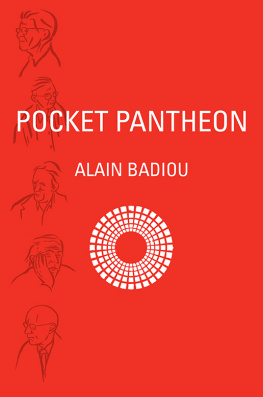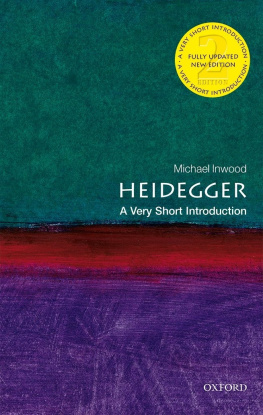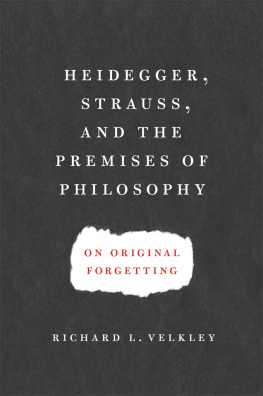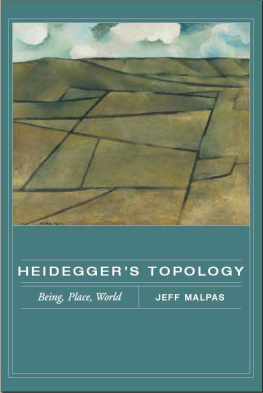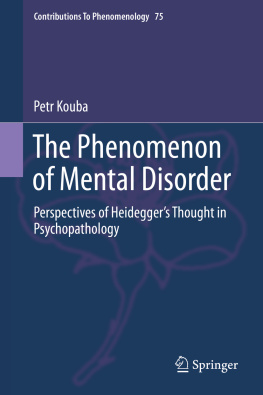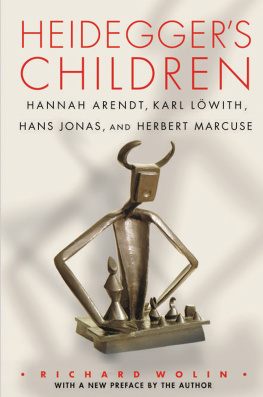Heidegger
INSURRECTIONS:
Critical Studies in Religion, Politics, and Culture
INSURRECTIONS:
CRITICAL STUDIES IN RELIGION, POLITICS, AND CULTURE
Slavoj iek, Clayton Crockett, Creston Davis, Jeffrey W. Robbins, Editors
The intersection of religion, politics, and culture is one of the most discussed areas in theory today. It also has the deepest and most wide-ranging impact on the world. Insurrections: Critical Studies in Religion, Politics, and Culture will bring the tools of philosophy and critical theory to the political implications of the religious turn. The series will address a range of religious traditions and political viewpoints in the United States, Europe, and other parts of the world. Without advocating any specific religious or theological stance, the series aims nonetheless to be faithful to the radical emancipatory potential of religion.
For the list of titles in this series, see
Heidegger
His Life & His Philosophy
ALAIN BADIOU & BARBARA CASSIN
TRANSLATED BY Susan Spitzer
INTRODUCTION BY Kenneth Reinhard
COLUMBIA UNIVERSITY PRESS NEW YORK
Columbia University Press
Publishers Since 1893
New York Chichester, West Sussex
cup.columbia.edu
Heidegger: Le Nazisme, les femmes, et les philosophes
copyright 2010 Librarie Arthme Fayard
English translation and introduction
copyright 2016 Columbia University Press
All rights reserved
EISBN 978-0-231-54224-1
Library of Congress Cataloging-in-Publication Data
Names: Badiou, Alain, author. | Cassin, Barbara, author.
Title: Heidegger : his life and philosophy / Alain Badiou and Barbara Cassin ; translated by Susan Spitzer ; introduction by Kenneth Reinhard.
Other titles: Heidegger. English
Description: New York : Columbia University Press, 2016. | Series: Insurrections: critical studies in religion, politics, and culture | Includes bibliographical references and index.
Identifiers: LCCN 2016002657| ISBN 9780231157964 (cloth : alk. paper) | ISBN 9780231157971 (pbk. : alk. paper) | ISBN 9780231542241 (e-book)
Subjects: LCSH: Heidegger, Martin, 18891976Relations with women. | Heidegger, Martin, 18891976Political and social views. | National socialism and philosophy.
Classification: LCC B3279.H49 B24413 2016 | DDC 193 [B] dc23
LC record available at https://lccn.loc.gov/2016002657
A Columbia University Press E-book.
CUP would be pleased to hear about your reading experience with this e-book at .
Cover & interior design by Martin N. Hinze.
References to websites (URLs) were accurate at the time of writing. Neither the author nor Columbia University Press is responsible for URLs that may have expired or changed since the manuscript was prepared.
Contents
KENNETH REINHARD
KENNETH REINHARD
Alain Badiou and Barbara Cassins Heidegger: His Life and His Philosophy began life as the introduction to the 2007 French edition of Martin Heideggers letters to his wife, Elfride, originally published in 2005 in German as Mein liebes Seelchen! Briefe Martin Heideggers an seine Frau Elfride 19151970 , and translated into French as Ma chre petite me: Lettres de Martin Heidegger sa femme Elfride 19151970 . An English edition appeared in 2010 as Letters to His Wife: 19151970 (dropping the originals My Dear Little Soul, Heideggers term of endearment for Elfride). After the Heidegger estate objected to Badiou and Cassins introduction and initiated legal action, the French publishers, Seuil, withdrew the volume. Badiou and Cassin decided to expand their introduction and publish it separately, and the result is this little book.
In its present form, separate from the volume of correspondence that it originally introduced, the book serves as Badiou and Cassins response to some key issues concerning Heidegger that emerge in and around the letters: Heideggers Nazism, his anti-Semitism, his relationships with women, and the relationship (or lack thereof) between philosophy and politics more generally. For the most part, the book is written in a single voice, but it is punctuated by local disagreements, where differences emerge between the two philosophers concerning Heidegger. Despite these disagreements, Badiou and Cassin agree about two basic questions: Heidegger was probably the most important philosopher of the twentieth century and he was a Nazi, although not an especially significant one. The issues on which they concur may not seem controversial, but in fact they define a careful middle path between the extreme positions held by a number of recent critics, especially in France, some who have denounced Heideggers philosophy as worthless, because saturated with his National Socialism, and others who minimize his involvement with the Nazi Party and refuse any connection between it and his philosophy. We might call such extreme positions synecdochal insofar as they isolate one aspect of Heideggers thought and take it to instantiate the whole, whether for better or worse. As Cassin puts it, Heideggers thinking, like that of all major philosophers, should be assumed to be fractal: every part is singular, infinitely nuanced, and solicits our always closer attention. We should neither reject Heideggers philosophy merely on account of his political activities nor refuse to take his politics into account when examining his philosophy
Cassins position in the seminar was no doubt complex: whereas her fellow seminarians may have assigned Cassin the rather familiar Arendtian role of the beautiful and brilliant Jewish philosopher, a local villager who saw her at breakfast with Heidegger spat at her for consorting with a notorious Nazi. For Cassin, the seminars dominant tension was a function of Char and Heidegger themselves: the effusive French poet and member of the Resistance, on the one hand, and the reserved German philosopher and member of the Nazi party, on the other. It was, we might say, the dialectic between them that provided the initial vector of Cassins later path through the history of philosophy by way of the poetic and rhetorical swerve of the Sophists, a path she calls, as distinct from ontology, logology .
This principle cannot be demonstrated, Aristotle writes, but must be assumed. Those who believe there is some other more basic principle, however, can be refuted by negative demonstration, but only if they are willing to argue, that is, to speak ; for the person who refuses to engage in reasonable discourse is, in a line that Cassin returns to frequently, no better than a mere plant. Thus the possibility of either accepting or rejecting this foundational metaphysical assertion depends on a theory of human communication; as Aristotle continues, The starting-point for all such arguments[is] that he shall say something which is significant both for himself and for another. The principle of noncontradiction requires the assumption of linguistic stability, that a word means the same thing for two different people or for one person at two different times. Aristotle excludes speaking for other reasonse.g., to persuade, to equivocate, or just for the pleasure of speakingas mere sophistry; indeed to speak in such a way is to be not fully human, no better than a plant. What Cassin calls logology (a term she borrows from Novalis) begins with the assumption that language is not primarily an act of communication, but a performance : rather than describing something, language first of all does or makes something in a world. If Heidegger led Cassin to investigate the pre-Socratics, Chars influence gave her some poetic distance from the ontology that Heidegger developed from them. It is the subversive supplementation of Heidegger with the Sophistsand their rhetorical excess of meaningthat allows Cassin to align herself with Heideggers deconstruction of metaphysics without, for that, becoming a Heideggerian.

